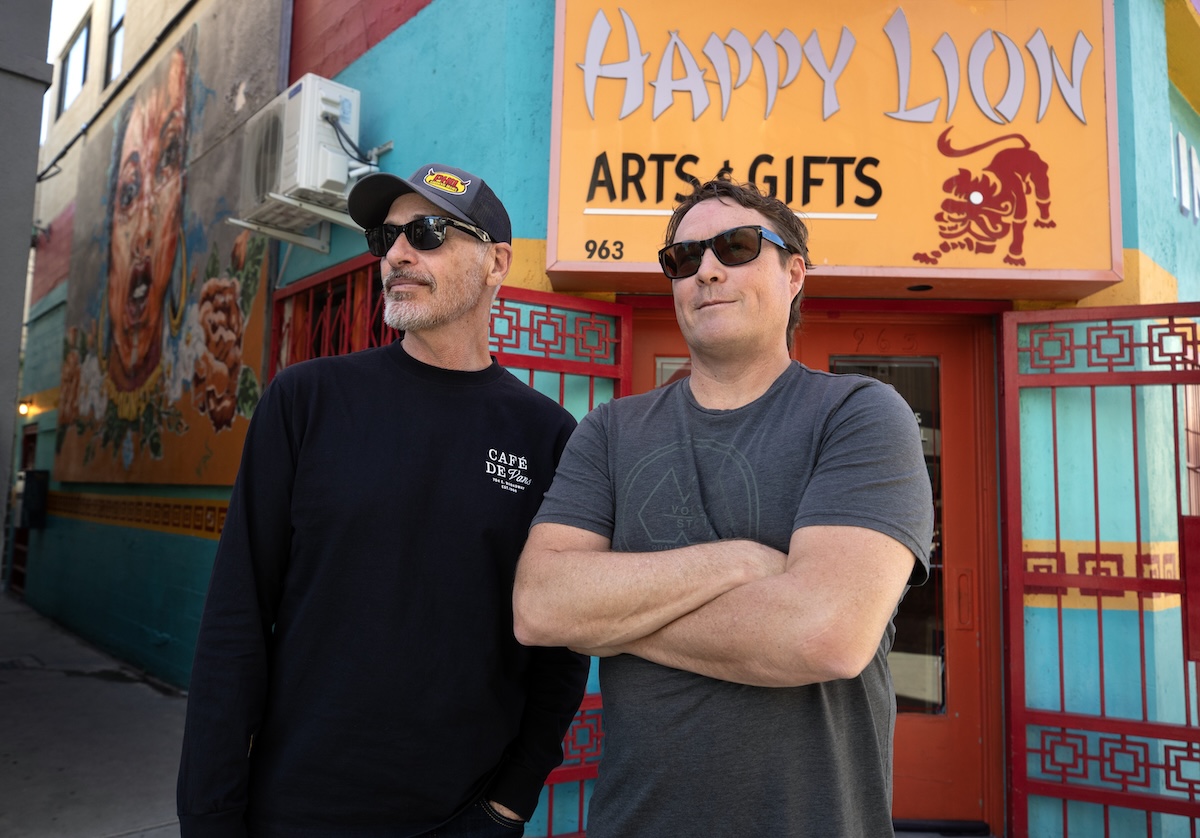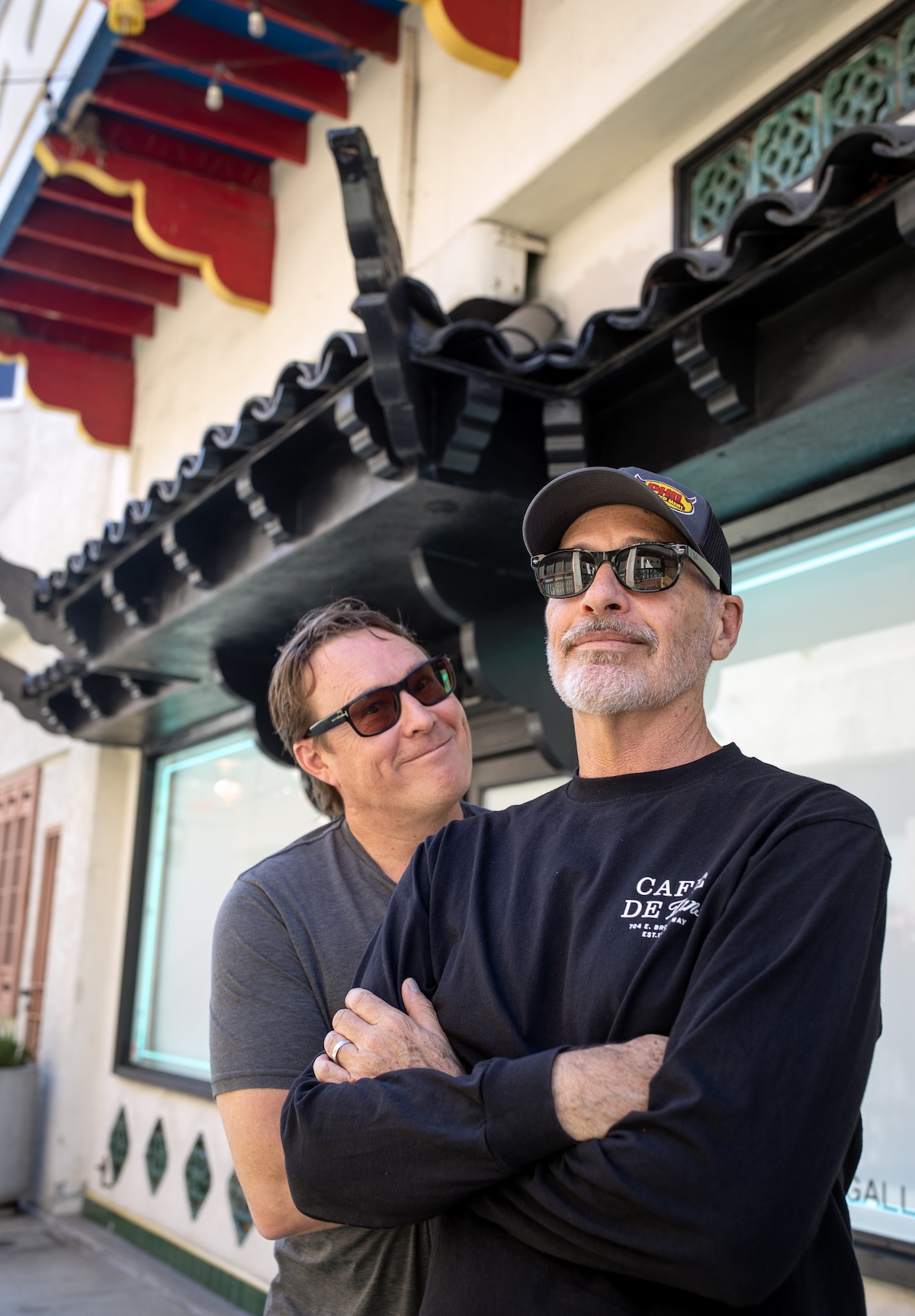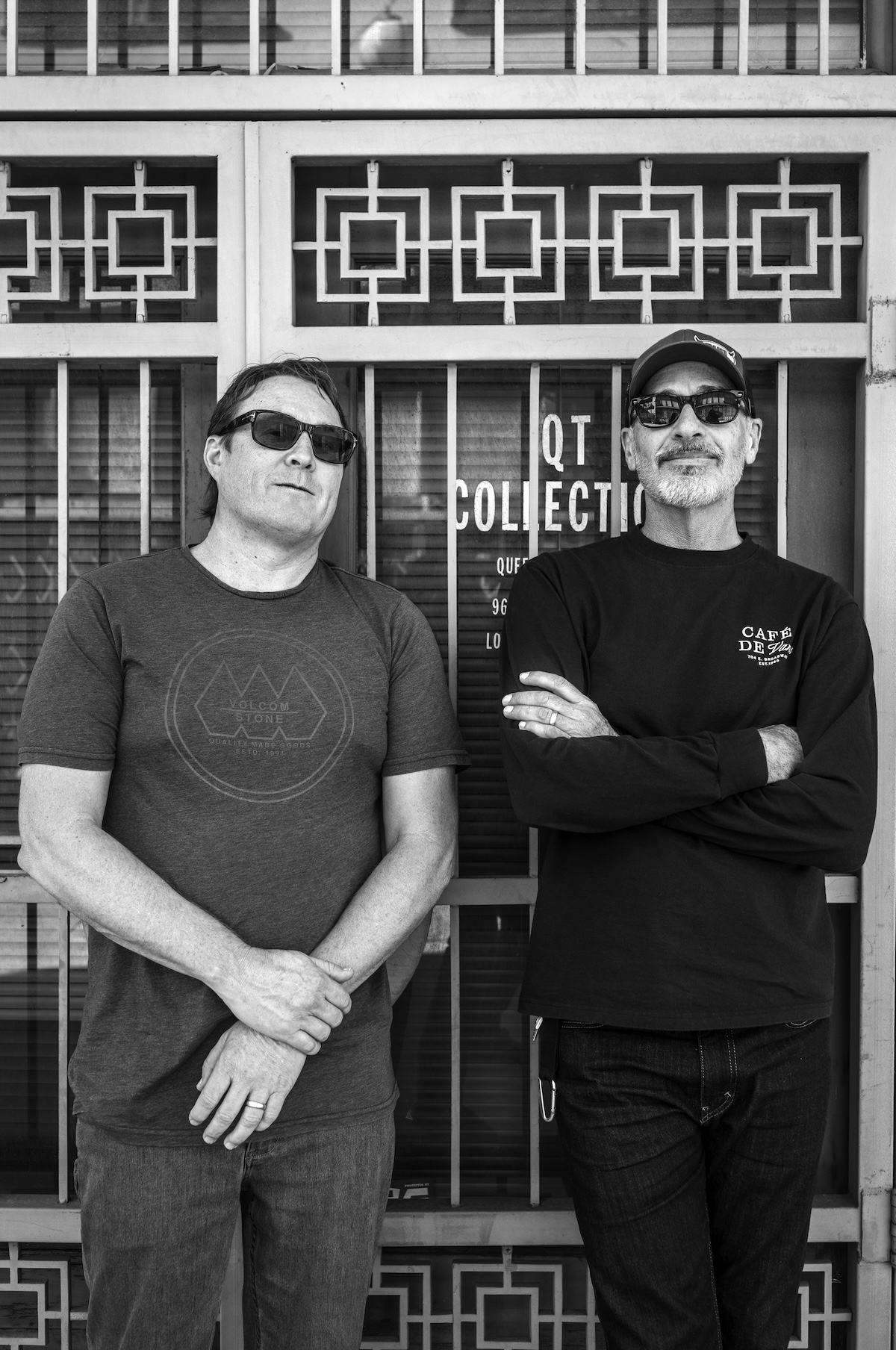Randy Bradbury’s life changed at 15. After being raised on a steady headbanging diet of Foghat, Black Sabbath, and Ted Nugent, he discovered a dangerous new sound called punk rock. It was the end of the ’70s, and many years before he would become the bassist for melodic hardcore heroes Pennywise, but that first taste of punk sent him hurtling down a path he’s been on ever since.
“The minute I could get out of the house, we were going to see as many shows as possible,” says Bradbury, who grew up in Long Beach, California, hitching rides to the Cuckoo’s Nest in Orange County and Hollywood clubs like the Starwood and Whisky a Go Go. “It was a landscape of discovery.”
At the moment, Bradbury is sitting outside a coffee place in L.A.’s Chinatown with his friend Cameron Webb, the Grammy-winning producer-engineer (Motörhead, Kelly Clarkson, Megadeth). Together they have a new band called 84 Days, created around a fresh batch of rock songs written and sung by Bradbury. The project’s debut album, 84 Days, was released November 7, and is a lively fusion of punk and other influences.
Webb says he hears a mid-’90s flavor in the songs, which were recorded at his studio in Huntington Beach, California, with the help of No Doubt drummer Adrian Young. Bradbury, who has also written songs for Pennywise, says the music of 84 Days is the kind of material that his day job never wants from him, as Pennywise guitarist Fletcher Dragge has told him.
“Fletcher is very witty,” says Bradbury, grinning, in dark shades, a black long-sleeved T-shirt, and graying beard. “He’ll say, [growls] ‘Why the fuck do you waste your time writing that shit?’ I write a lot of stuff like that. So when I went in to write these songs, I wasn’t writing them for anybody. I was just gonna write songs for myself. That’s all I did.”
Bradbury and Webb are just steps away from the former Hong Kong Café, one of the birthplaces of L.A. punk rock in the 1970s. Bradbury never made it to the Hong Kong Café back then, but vividly remembers many other nights in the city as a teenage commando discovering the Dead Kennedys, Circle Jerks, Plasmatics, and more. He only missed out on seeing the last-ever show by the Germs because it was a school night.
He got up to L.A. any way he could, and he remembers the riot that erupted at Baces Hall with Black Flag and the Adolescents in 1980. “All the cops were out front and it turned into a riot because all the Black Flag shows were turning into riots then,” he says. But seeing Black Flag bassist Chuck Dukowski in action made a lasting impression. “I was like, that’s what I need to do! I need to be that.”
On another night, he was at the Whisky seeing the Go-Go’s, then firmly part of the L.A. punk scene. Bradbury was slam-dancing that night. “I got up on stage and I flipped everyone off and I dove off the stage—and the seas split,” he says with a laugh about the crowd, “and I just landed on my back. The wind’s knocked out of me, the bouncer’s grabbing me, and threw me out in the alley. And I’m like, ‘Oh, I can’t breathe!’ Who knows, maybe I broke my back. It was messed up for like three months.”
It was then that he realized he’d rather be playing music than stage-diving. But whether he was in the crowd or in the spotlight, the punk movement felt like “a revolution” that opened his mind not just to new sounds, but to a way of thinking and to generally questioning authority. He recreates that moment of revelation in the lyrics of the 84 Days song “Don’t Trust the Government,” as Bradbury sings: “1980—driving up to Hollywood / With the cassette player on … DIY—just do it all yourself they would say / We need to take the fucking power back right away.”
“I grew up in a house with shag carpeting and I was pulling the fleas off my leg every morning before I went surfing,” Bradbury remembers. “There was a lot of waking up. I thought there was an important message in the music we were hearing, and it felt obvious to me.”
Webb was born in 1972, so he wasn’t old enough to get out to the clubs until the late-’80s to see Jane’s Addiction and the Red Hot Chili Peppers. Webb was also in bands starting at age 15, but eventually veered into a career in the recording studio, learning from major record producers like Terry Date (Deftones, Pantera).
The producer-engineer first met Pennywise backstage at the House of Blues chapter that was then adjacent to Disneyland. After complimenting the band on their first three albums, he told them, “Yeah, your last couple records don’t sound so good. You guys need to step it up.”
“I thought they were gonna kill me,” Webb says now, laughing. “I wanted to work with them. So I just put it all out there. … I chased them for a year. And then one day Fletcher calls: ‘Do you wanna do a Pennywise record?’ And I go, ‘Fuck yeah, I do.’ He goes, ‘We want to start next week.’”
Webb ended up recording three albums with Pennywise—Reason to Believe (2008), All or Nothing (2012), and their most recent, Never Gonna Die (2018)—and got to know the band well. So when Bradbury experienced a burst of songwriting that began during the COVID pandemic, he shared what he had with the producer.
“I hadn’t written for about five years. I hadn’t been in the studio and then the COVID thing hit. We’re sitting around, I’m not working. I was trying to day trade,” says Bradbury, describing his growing frustration. “So I’m like, I need to get back in the studio. I’m just going to start writing. I was kind of purposeful.”

At the same time, his mindset was that no one would ever hear the songs, since they weren’t likely to work for Pennywise, and he had no other outlet for them. Since 1996, he’s been the band’s bassist and a contributing songwriter, but in the past, his Pennywise songs tended to be “for color for the album, because I write a certain style,” he says.
Webb adds, “I saw him submit songs to Pennywise for a long time, and sometimes they were too slow or too different. And so when he sent me a bunch of songs, I said, ‘Well, are these just B sides for Pennywise that they didn’t accept?’ He goes, ‘No, these are fresh things I did.’”
Webb loved what he heard, and they decided to go into the studio. Anything that sounded like it could work for Pennywise was set aside. “Treat that for your full-time job, your band,” Webb recalls advising him. “But these other ones, Pennywise is not going to want these kinds of songs, but these are rad songs.”
In time, Webb’s role grew beyond producer to collaborator and band member, sometimes playing bass while Bradbury sang and played guitar. “He’s technically the boss in the end,” Webb says of Bradbury, “but if I don’t like something, I’m going to push pretty hard. I’m going to be stubborn as fuck.”
Bradbury adds, “I don’t like to micromanage. Cameron’s great. I’m going to let him do his best job.”

Their chosen band name came both from a meaningless phrase Bradbury’s has used now and then, and also from one of his favorite books, George Orwell’s 1984, which he first read as a young punk rocker. “I didn’t realize how much of an impact that was going to have on the way I see the world, but it does a lot,” says Bradbury. “It’s very relevant.”
The album opens with the driving, catchy “Mockingbird Brains,” which was also released as the band’s first single, with a colorful music video playfully filled with conspiracy and paranoia elements. In the song, Bradbury’s vocal begins: “Media mockingbirds, zombies hypnotized / Cage-painting parrots squawking vomiting lies.”
“It feels like people aren’t thinking for themselves,” Bradbury says of the lyrics. “We’re all influenced by our algorithms, and if the algorithm senses that you have a certain preference now, that’s all you’re gonna get. Then you think this is how the world is. You’re crazy if you don’t agree, and now everyone wants to kill each other.”
During the recording, they recruited Warren Fitzgerald of the Vandals for some additional guitar, and on drums signed up Young, who had always said he was available for projects, paid or not. “Adrian said, ‘Hey, I’d love to play drums on your record, but I don’t want to be in another band,” says Webb. “‘I’m already in a band.’ So it’s like, okay, that’s cool.”
“He plays amazing,” says Bradbury. “To have Cameron produce it, and Adrian playing drums on it, I’m like, ‘Okay, this has a chance to be as good as I can imagine.’”

Erik “Smelly” Sandin from NOFX is now on drums for the band, and will be onstage when 84 Days plays a few West Coast shows in support of the Vandals in December. Webb will be on bass, and more concerts are planned for 2026. “You don’t have anything if you don’t have a great drummer,” says Bradbury. “I love playing live. I love playing in the studio. It’s the best thing ever since the time I was 15 years old and sat on the edge of my bed and started learning Dead Boys songs.”
While Bradbury does a lot of singing in Pennywise (with harmonies, backgrounds, etc. alongside frontman Jim Lindberg), this is his first time as the central voice on an album. It’s been a new challenge for the punk lifer.
“Now that we’re playing a live situation, I’m like, ‘I can’t breathe!’” Bradbury explains, laughing. “Why did I do an extra chorus here? Wow, there’s a lot of lyrics there! So we’re working those out. We’re gonna put together a cool live show.”



